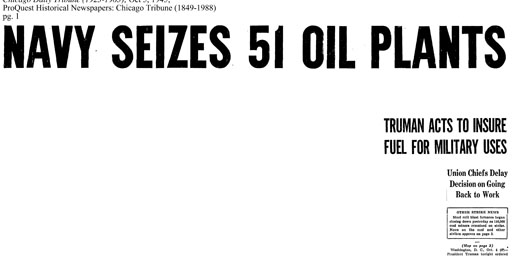
On Oct. 4, 1945, President Harry Truman ordered the U.S. Navy to seize oil refineries involved in a strike that stretched from coast to coast. Some 43,000 workers at 11 companies were forced to strike in September 1945 over the owners’ refusal to cut work hours and raise wages. During World War II, oil workers agreed to work much more than 40 hours a week for the war effort. After the war ended, workers expected a return to pre-war workweek. Instead the oil industry barons insisted on longer hours and threatened to cut wages, despite high profits.
Truman’s labor secretary had attempted to negotiate an agreement to end the strike, but 10 of the 11 companies refused the terms of the compromise. The oil workers, represented by the CIO’s Oil Workers Union, had agreed to the truce.
Saying it threatened national security, Truman ordered the Navy to take over the refineries. The next day the union leadership “ordered” the 43,000 workers “back to work,” the Chicago Tribune reported.
Starting under Truman, the Cold War doctrine, virulent anti-Communist witch hunts and anti-labor legislation like Taft-Hartley were products of the post-war 1940s and 1950s, resulting in a great setback to democratic rights.












Comments